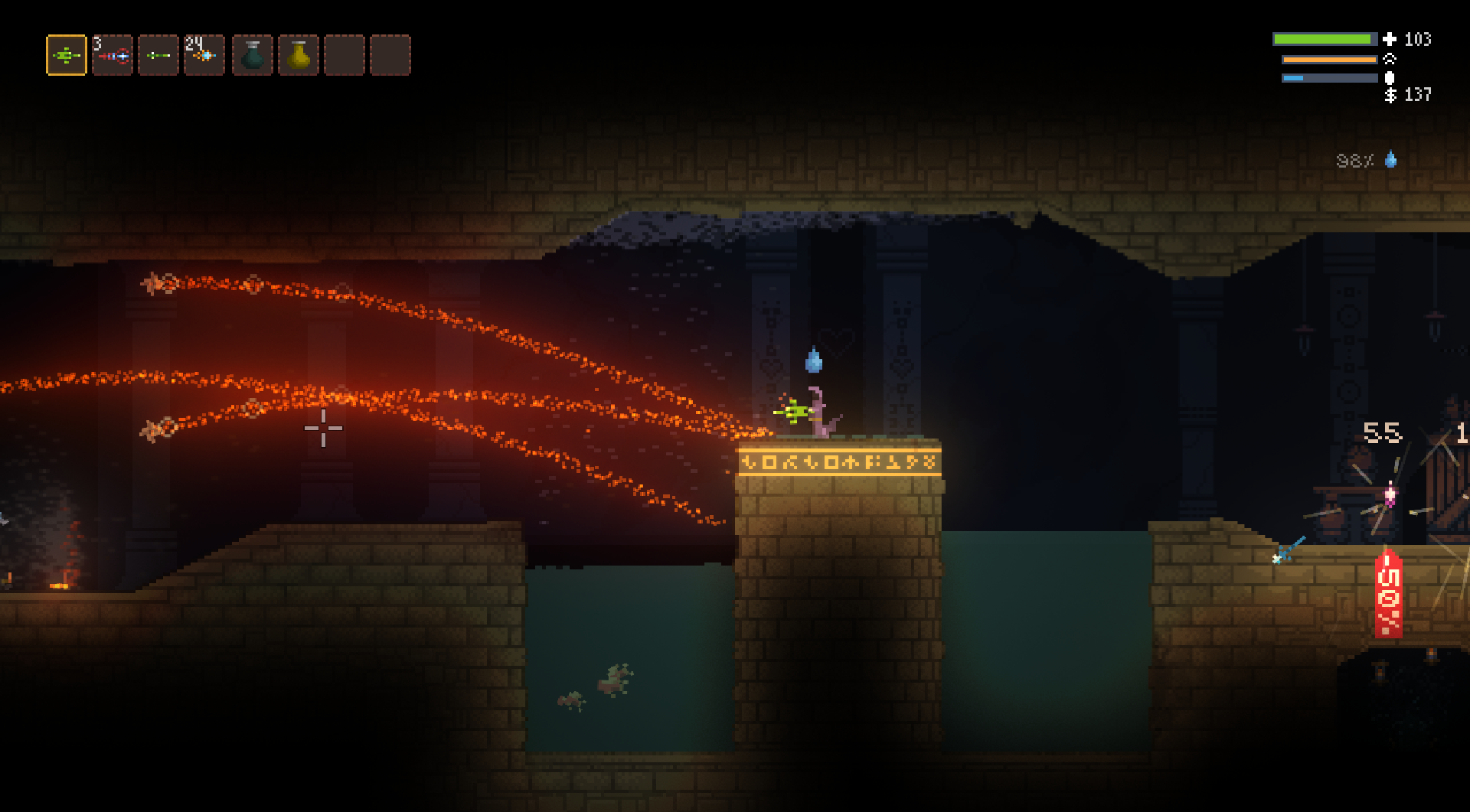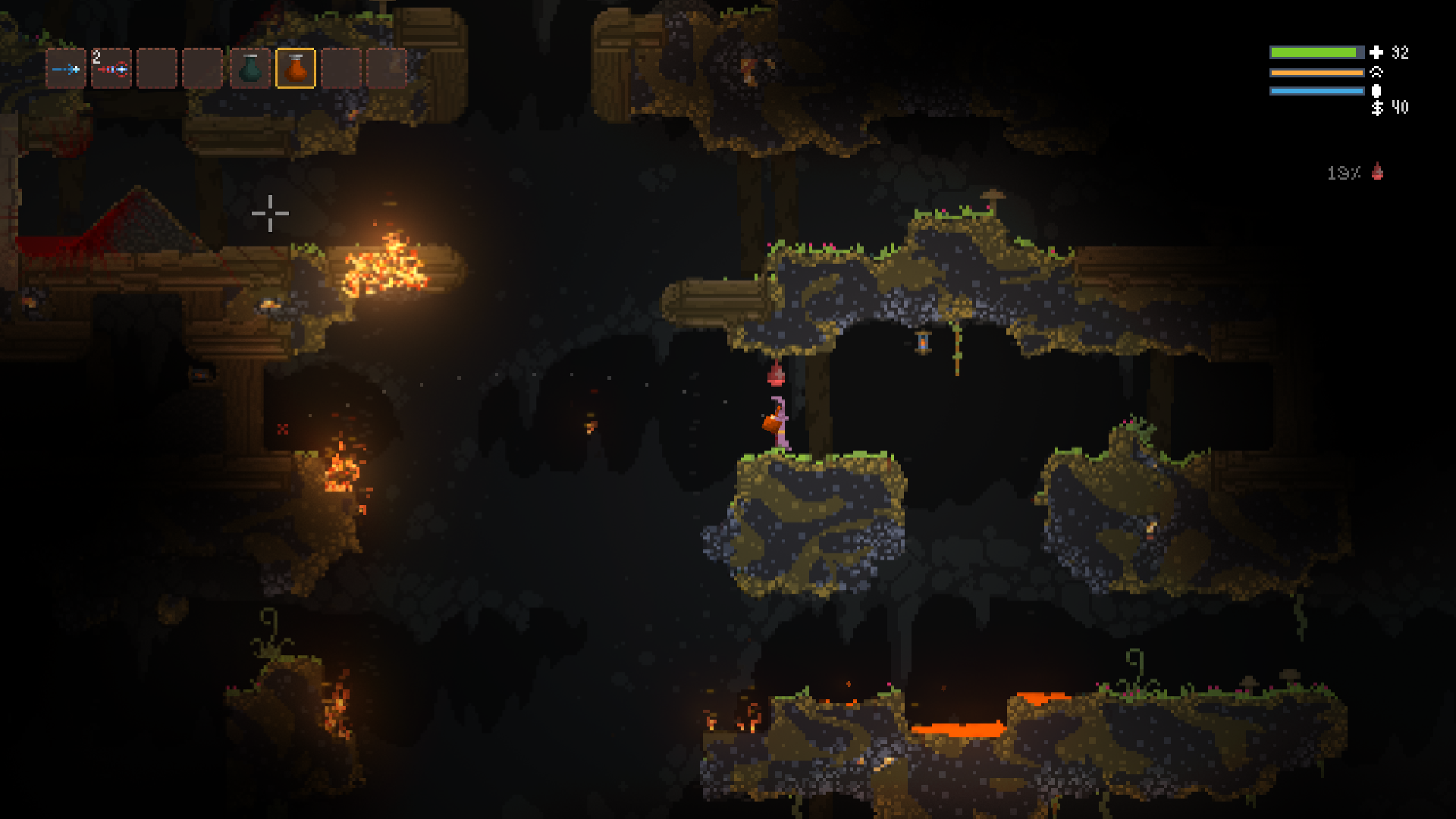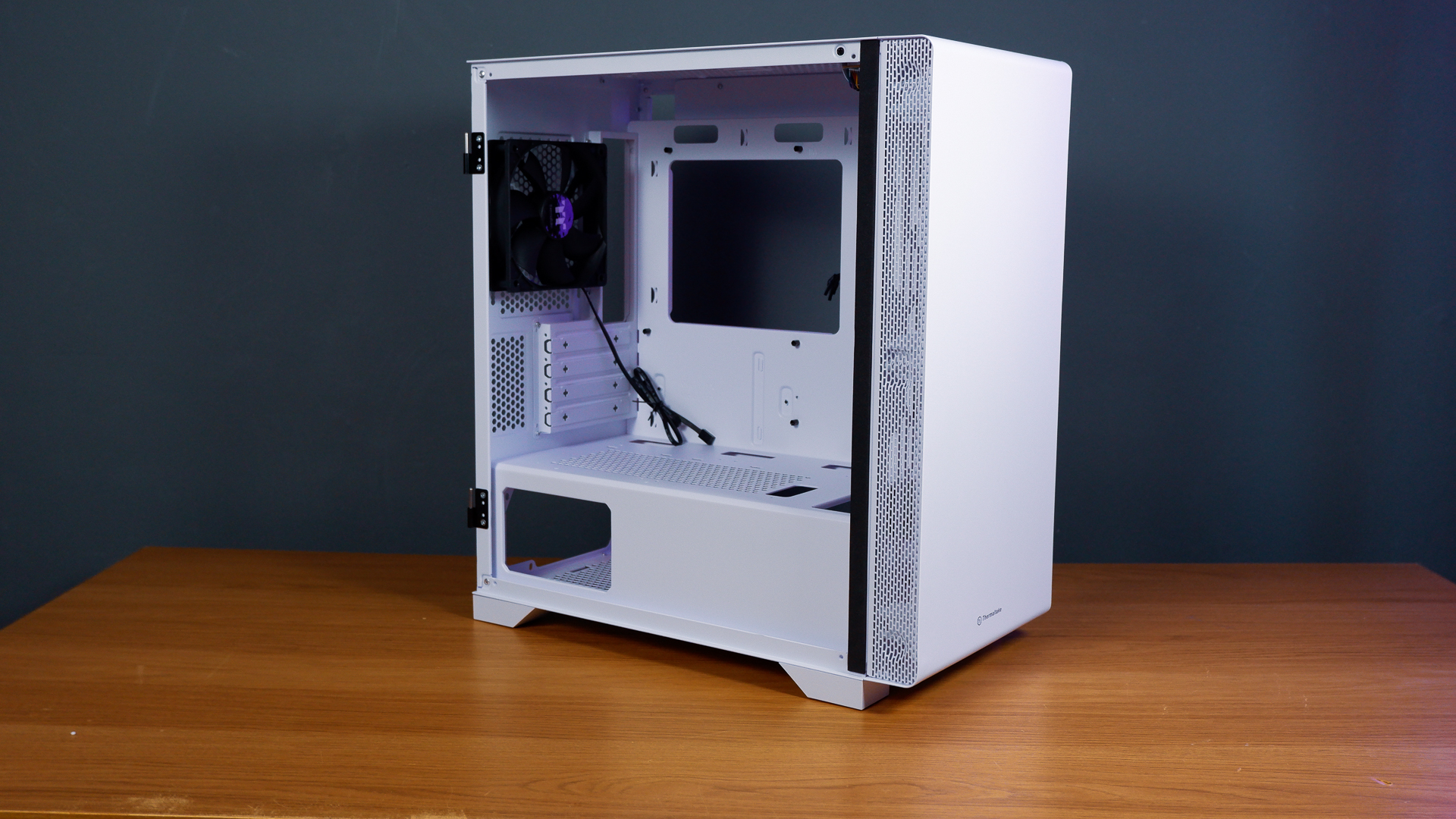Our Verdict
Noita combines classic roguelike progression with complex RPG-style spellbuilding and sets it in an incredibly dynamic environment.
PC Gamer's got your back
Deep in the murky crevices of Noita, within one of the rest areas between its infernal biomes, I absent-mindedly purchased a spell modifier I didn't fully understand. One of the core facets of this wonderful, maddening roguelike is the many ways you can alter your magic wands. With clever min-maxing and a little bit of exploration luck, you can become a true master of arcane prowess. But there is no safety net if that experimentation goes awry, or if you're not paying attention. And so, I strapped this particular modifier to a wand that shoots a comically large spiral razorblade. I pointed to a distant wall, and clicked. The razorblade shot out towards the bricks, immediately cranked a U-turn, and plowed into my wizard at full-speed, killing me instantly.
What is it? A wizardy, spell-slinging roguelike
Expect to pay: $20
Developer: Nolla Games
Publisher: Nolla Games
Reviewed on: Windows 10, Intel Core i7-9700 CPU GTX 1070 16.0 GB RAM
Multiplayer: No
Link: https://noitagame.com/
After doing my research, I believe the modifier I attached to that wand was called "Boomerang," and according to the greater Noita community, it's pretty much useless unless paired with various healing spells. That's the thing with Noita: Even the power-ups are conspiring to kill you.
There was a time, in the ice caves, where I found a wand that had an ability called "Unstable Crystal" on it. I pulled the trigger, and immediately exploded, provoking another game over. I've accidentally polymorphed myself too many times to count. I've self-immolated, I've detonated explosive barrels that I didn't see until it was too late, and I've almost drowned in a vat full of whiskey. But despite all of those mishaps, I think Noita is one of the best roguelikes of the year (a year with Spelunky 2 and Hades, no less). It isn't an easy game, nor is it fair, or balanced, or well-polished. But it can be absurd, brilliant fun, as long as you have the stomach for some turbid deaths along the way.
Every new Noita seed begins with your character—a robed, Dementor-like wizard—perched at the precipice of a yawning cavern system just below your feet. Like most roguelikes, the structure of the world is consistent every time out. If you decide to traverse downwards (which isn't the only direction you're limited to), the wizard will first encounter the mines, and then the coal pits, the frozen depths, a steel alien stronghold, a toxic jungle, and so on. The way Noita diverges from games like Hades or Spelunky is that there is no meta progression to speak of. You will not be incrementally juicing your health or attack power at the start of each run; there is no talent tree here to bail you out. Instead, every game of Noita is a self-contained universe up until the moment the warlock on screen meets their inevitable, untimely demise. Freedom, here, can only be achieved by getting good.
If you know anything about Noita, it's probably that every pixel in the game is fully simulated. That became a huge talking point while the game was in Early Access, and what that means in practice is that nothing in the environment is static, and objects and enemies tend to cascade like teetering dominoes stacked in front of one another. Shoot a lantern with your wand, and watch the flames lazily snake through the moss and wood below, as individually rendered beads of smoke compress against the cave walls. Toss a bomb at the bottom of an underground lake and the bedrock is obliterated, creating a new waterfall that tumbles through the shattered earth. Use freezing magic on any liquid substance and see the chunks of jagged ice float to the top.
Noita trusts you to experiment with these combinations without guaranteeing that any of them will be effective.
One of Noita's most ingenious uses of this 2D physics simulation is how it equips your wizard with flasks that can capture any of the fluidic reagents in the game. Sometimes, they can be used as magic potions—downing a glass of ambrosia will render yourself briefly immortal. Other times though, you can use them to solve problems with your mortal, mundane brain. That seemingly impassable lava pit on the eastern end of the mines? Consider spraying your water bottle at it. The whole system gives Noita a simmy granularity that other games in the genre lack.

As I mentioned before, in between each biome the wizard will encounter a rest stop. It's called the Holy Mountain, and when you arrive you can heal to full, recharge all depleted spellcasting ammunition, and shop for a few new augmentations using the gold nuggets you picked off corpses. (You also select a free perk, which can have some game-breaking effects. For instance, one makes you immune to fire damage for the rest of the run.)
The Holy Mountain is where most of the character-building in Noita occurs. An action bar tiles the top of the screen, where players can store the various magical abilities and enhancements they find along their journey. In the Holy Mountain, they can drag those down into the slots available on their equipped wands, leading to combos that can be lethal and self-destructive in equal measure. Do you want a wand that produces a black hole, a vertical beam of piercing light, and a gauzy screen-filling rain cloud? Noita trusts you to experiment with these combinations without guaranteeing that any of them will be effective.
There are few games that create the sheer maelstrom of activity that Noita does.
The closest comparison I can think of is Terraria. Both games encourage us to manipulate the forces of nature, finding synergy where we can, and they're each stocked with thick compendiums of spells, enemies, relationships, easter eggs, status effects, and locations. Much like Terraria, my time with Noita is often spent with the corresponding wiki in hand. This is a game that has benefited greatly from its extended time in Early Access on Steam. The community has already turned over many stones, and that can be handy when you're getting your feet wet. For instance, there are two alchemic combinations that produce some absurdly powerful solutions, but the ingredients are randomly assigned each run and are kept completely secret from the player... unless you go to a fanmade website and input your seed number. I, as a complete newbie, would've had no idea that existed if it weren't for the robust braintrust surrounding the game.
There are a million other examples like that in Noita. If you travel upwards towards the sky, you can scale through multiple levels of enemies before landing on the moon. There's a pyramid far to the west, and an absurdly deep body of water to the east. If you want more intrigue, there's a series of cryptic baubles hidden across the land. Collect them, bring them to the right place, and without spoiling anything, you will drastically alter the consistency of reality.
Most newcomers will scarcely scratch the surface of Noita's underworld. This is a punishing game, and you will die in some deeply stupid ways. In particular, I find that once I hit the third biome, the difficulty curve takes a sharp right turn into hell. A typical major combat encounter includes globules of poison spit, conflagrating fireballs, reckless explosions, and distant snipers with laser-sights trained on your wizard's hooded head. (Yes, there are snipers in this game. Noita plays it pretty fast and loose with its various inspirations.)
Roguelikes are traditionally uncompromising, so this is an odd complaint to make, but I wish I had a better sense of how much better I was becoming at Noita. It does the Spelunky thing, where the longer you spend in the cave the more you become accustomed to how the world interacts with each other. (Pro tip: Water dilutes poison.) But in the heat of the chaos, when I'm equipped with a rinky-dink wand and staring down dozens of different enemies coming for their vengeance, I sometimes don't know how I'm meant to succeed. Surely, that is a problem long eroded by the game's closest adherents; they've uncovered the best perks, best spells, and best routing strategies to make those hangups trivial. But entry-level players arriving for the 1.0 release will marvel at Noita's giddy anarchy, while also feeling a bit overwhelmed by the mess.
That said, there are few games that can create the sheer maelstrom of activity that Noita does. You're in a firefight with a shock trooper, your spell zings over his head and strikes the pile of gunpowder lurking in the shadows. Suddenly, both of you are trapped in a burning chasm, as the wooden vat containing a metric ton of oil begins to deteriorate in the flames. Noita desperately wants to show you what its little box of horrors is capable of, players just need to be patient enough to enjoy it.
Noita combines classic roguelike progression with complex RPG-style spellbuilding and sets it in an incredibly dynamic environment.

Luke Winkie is a freelance journalist and contributor to many publications, including PC Gamer, The New York Times, Gawker, Slate, and Mel Magazine. In between bouts of writing about Hearthstone, World of Warcraft and Twitch culture here on PC Gamer, Luke also publishes the newsletter On Posting. As a self-described "chronic poster," Luke has "spent hours deep-scrolling through surreptitious Likes tabs to uncover the root of intra-publication beef and broken down quote-tweet animosity like it’s Super Bowl tape." When he graduated from journalism school, he had no idea how bad it was going to get.


